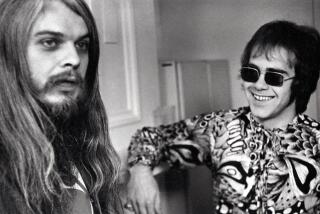BOOK REVIEW : Love Is the Answer in an Eccentric Family : THE BUBBLE REPUTATION <i> by Cathie Pelletier</i> ; Crown $21,272 pages
- Share via
Just to orient yourself about Northern Maine, the author suggests you “look for Allagash on the map. If it’s not there, find Ft. Kent. See what I mean? Now I won’t have to explain anymore.” Once there, you’re a long, long way from Bar Harbor and well out of L.L. Bean’s ZIP code. Bangor is practically Dixie.
The town of Bixley, with a population somewhat in excess of 20,000, is a metropolis compared to the village of 456 souls that served as the setting for Cathie Pelletier’s wonderfully satirical “Once Upon a Time on the Banks,” but the ratio of eccentrics to plain folks in her newest work remains about the same. That means the central character is virtually the only person whose behavior is explicable, which is not quite the same as rational.
There are, however, reasons why Rosemary O’Neal is spending aimless days grooming her cats, trying out new varieties of birdseed and clipping pennies-off coupons for goods she’ll never buy, reasons why she has moved out of her comfortable house to sleep in a tent in the woods.
Rosemary’s husband, William, has recently wound up one of his painting trips to Europe by committing suicide, and she is attempting to come to terms with his death. Aside from some vaguely metaphysical remarks made in the course of their eight-year marriage, she hasn’t a clue about why he took his life, and neither does his traveling companion and old friend, Michael.
Fame had eluded William, but fame eludes millions of artists, and they stay alive. William had kept in touch by writing cryptic postcards, none of which seemed essentially different from the cards he’d written on other journeys. Three months after his death, Rosemary still hasn’t re-entered the world, though her family and friends are making strenuous efforts to push and pull her back into life.
If you had a family like Rosemary’s, you too might choose to become an anchorite.
Uncle Bishop is a case in point. He’s a politically incorrect homosexual gentleman with a sharp tongue, a kind and generous heart and a predilection for shoe fights with his lover, shoe fights so destructive that he’s reduced to going around in his socks.
Rosemary’s mother is certifiably mad. Her pitiful attempts at conversation emerge as the tag lines of old commercials interspersed with frequent requests for soft chocolates. She’s cared for by her devoted sister, Rachel, a self-sacrificing spinster who is desperately ill herself.
Rosemary’s own sister, Miriam, who dresses entirely in green, is about to shed her fourth husband, a situation that aggravates her abrasive personality still further.
There’s also an affectionate and apparently stable brother Robbie, but his appearances are too brief to make a difference.
Given such relatives, one would naturally turn to friends for comfort, but Rosemary is no luckier there. Her best friend, Lizzie, once such a rock of stability and good sense, pays an extended condolence call that turns out to be a front for an illicit love affair. Rosemary winds up with the errant wife, the aggrieved husband and the foppish lover all as house guests, which would be enough in itself to send even a happy hostess into a back yard tent.
We meet only one neighbor, the elderly widow Mrs. Abernathy, whose front yard is covered in Astroturf and vacuumed daily.
Given the sad circumstances, it would be unreasonable to expect “The Bubble Reputation” to be as corrosively funny as “Once Upon a Time on the Banks,” in which the characters were not only eccentric but hilariously evil. In contrast to that crowd, Rosemary’s family and friends come dangerously close to seeming pathetic.
Although an appreciative giggle at Uncle Bishop’s witticisms might be permissible, it would be cruel to have fun at mother’s expense and callous to laugh at Mrs. Abernathy’s attempts to straighten up the lawn. Miriam’s excesses provide a touch of comic relief, but not quite enough to offset the prevailing anguish. Lizzie and her two squabbling men are diverting but extraneous.
In the end, it’s family that counts, and what Pelletier has done here is redefine dysfunctional . If they love you enough, that trendy word doesn’t mean a thing.
More to Read
Sign up for our Book Club newsletter
Get the latest news, events and more from the Los Angeles Times Book Club, and help us get L.A. reading and talking.
You may occasionally receive promotional content from the Los Angeles Times.








